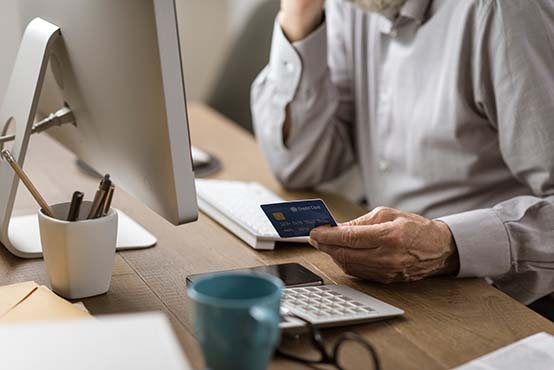Safe Online Shopping

- Search the Internet safely. Even though search engines are very useful when you’re looking for products, reviews, or price comparisons, you run the risk of unintentionally clicking on ‘poisoned’ search results that could lead you to malware instead of your intended destination. These poisoned search results are created by cybercriminals that use search engine optimization (SEO) tricks – sometimes referred to as Black SEO – to manipulate search engine results to include malicious links.
- Type the URL into the address bar. Instead of just clicking a link to take you to your chosen retailer’s website, it’s safer to type the retailer’s URL into the address bar on your web browser. It may take a little more effort, but this simple action can help to prevent you visiting a fake or malicious website.
- Credit Cards. Use the safest way to pay on the Internet. Pay for your order using a credit card. The safest way to purchase items via the Internet is by credit card because you can often dispute the charges if something is wrong.
- Get a temporary credit card. Some credit card companies will issue a temporary credit card number for their customers. These temporary numbers can be useful for one-time purchases. However, you should avoid using them for any purchases that require auto-renewal or regular payments.
- Don't give out your credit card number(s) online unless the site is a secure and reputable site. Sometimes a tiny icon of a padlock appears to symbolize a higher level of security to transmit data. This icon is not a guarantee of a secure site, but might provide you some assurance.
- Check on your credit card statements. Check your bank statements on a monthly basis. Don't let them sit and pile up, anyone who uses a credit card could potentially be hacked and could become a victim through no fault of their own.
- Dedicate a computer to online banking and shopping. For added security, you could use a dedicated machine for online banking and shopping. This should be a ‘clean’ computer that is totally free of computer viruses and any other infections. In order to help keep it clean, the machine should not be used for any casual web browsing, social networking, or email. Install Google Chrome, with forced HTTPS.
- Use a dedicated email address. It’s worth considering creating an email address that you only use for online shopping. This can help you to reduce the risk of opening potentially malicious email or spam messages that are disguised as sales promotions or other notifications. If such messages are sent to your primary email address, you’ll be aware that there’s a fair chance that they’re fake or malicious.
- Manage and protect your online passwords. Using a password manager can help you to deal with multiple accounts and passwords – and to encrypt passwords that would otherwise be in plain text. Some antivirus and Internet security software products include password management and password security features.
- Beware of using public Wi-Fi. When you’re in a shopping mall – about to make a purchase – it can be useful to make a last minute comparison with the best deals that Internet retailers are offering. However, there can be security risks if you access the Internet via a public Wi-Fi network. Cybercriminals can intercept your data and capture your passwords, login details, and financial information. If you need to access the Internet when you’re out shopping, it’s safer to do so via your cellular network.
- Before using the site, check out the security/encryption software it uses.
- Make sure you are purchasing merchandise from a reputable source.
- Send them e-mail to see if they have an active e-mail address and be wary of sellers who use free e-mail services where a credit card wasn't required to open the account. Consider not purchasing from sellers who won't provide you with this type of information.
- Check with the Better Business Bureau from the seller's area.
- Check out other web sites regarding this person/company.
- Don't judge a person/company by their web site